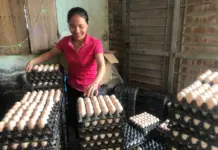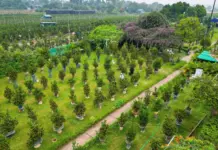 |
| A volunteer from BASF Vietnam (1st L) helps teachers and students from Duong Van Lich school to conduct online experiments – PHOTO: COURTESY OF BASF VIETNAM |
In partnership with the HCMC Department of Education and Training, BASF hosted a training workshop for the teachers and students of Duong Van Lich Primary School in HCMC’s Nha Be District to familiarize them with the fascinating experiments and learn what chemistry means to their daily lives. The company also donated 20 computers to the school, providing teachers and students with access to computer science and technology.
For the two newly launched experiments, the “Energy from the Sun” experiment helps the kids discover how a solar cell works and how it converts as much sunlight as possible into environmentally friendly energy sources.
In the “Foaming Beads” experiment, the students will examine what makes insulating materials and their differences before they learn to make the insulating materials themselves.
The BASF Virtual Lab, an extension of BASF’s global hands-on chemistry education program Kids’ Lab, provides a wide range of interactive experiments online.
The BASF Kids’ Lab is a global program that aims to develop children’s interests in natural sciences from an early age. In partnership with the HCMC Department of Education and Training, BASF has been implementing this annual program in Vietnam since 2011, which attracted almost 5,000 primary students in the city.
“This year, due to the Covid-19 pandemic, we cannot host physical Kids’ Lab sessions. Instead, we offer our future scientists two more online games in Vietnamese at the BASF Virtual Lab. They can explore the amazing world of chemistry from the comfort of their school or home,” noted Erick Contreras, managing director of BASF Vietnam.
BASF Vietnam has been active in multiple community projects, including the partnership with the Saigon Children’s Charity to renovate schools and provide scholarships to disadvantaged university students. The company has also constructed four public playgrounds, which are accessible to more than 12,000 children to help them develop a variety of skills that are important to a child’s development.



